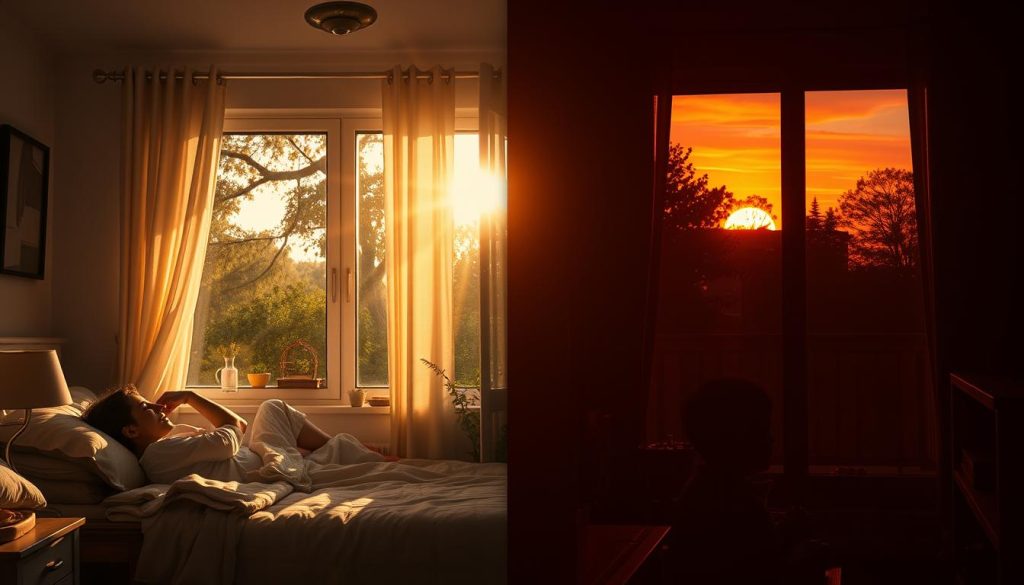Understanding circadian rhythm aging is key for my wellness as I age. My body’s internal clock, or circadian rhythm, runs on a 24-hour cycle. It controls my sleep, hormone release, and other functions. As I get older, it’s vital to adapt and take steps for better health.
Studies show that disruptions to my biological clock can cause health problems. This highlights the need to know how these rhythms change with age. Knowing this helps me work towards better health and a balanced aging process.
Understanding Circadian Rhythms
Circadian rhythms are key to my daily life, controlling my body and mind. They are led by the suprachiasmatic nucleus (SCN) in the brain. This small area responds to light, helping my body keep in sync with day and night.
Light exposure is vital for my health. When light hits my eyes, it tells the SCN to adjust my body’s functions. This adjustment helps me know when to be awake or sleep, affecting how well I do things.
These rhythms also shape my daily life, from energy to focus. Sticking to these natural cycles can boost my concentration and alertness. But, ignoring them can make me feel tired and cranky, showing how important they are.
| Aspect | Function |
|---|---|
| Circadian Rhythms | Regulate sleep, hormonal release, body temperature |
| Biological Clock (SCN) | Responds to light, maintains rhythm synchronization |
| Sleep Cycle | Influences alertness, mood, cognitive function |
| Neurotransmitters | Control sleep/wake states, impact behavioral responses |
How Circadian Rhythm Influences My Daily Life
My daily life is shaped by my circadian rhythms. These internal clocks control my activities, energy, and mood. For example, I’m most productive in the morning after a good sleep. I’m alert and focused, ready to handle tasks that need deep thinking.

As the day goes on, my energy levels change. By early afternoon, I often feel a dip. This is when I take a break or have a light snack. It’s a natural reset that helps me recharge.
My eating habits also affect my mood. Meals with protein give me more energy than those heavy in carbs. This shows how important food choices are for my mood.
As I get older, my sleep patterns change. I wake up earlier, which changes my routine. While I stick to a schedule, these changes can make me tired or irritable. It’s clear how my biological clock affects my well-being.
Circadian Rhythm Aging: The Science Behind It
Aging changes our circadian rhythms, mainly through hormonal shifts. This connection impacts my daily life and health. Melatonin, known as the sleep hormone, plays a big role.
The Role of Melatonin
Melatonin comes from the pineal gland and controls my sleep-wake cycles. As I get older, melatonin levels go down. This can make my sleep quality and duration worse.
This decrease in melatonin messes with my circadian rhythm aging. It makes it tough to keep a regular sleep schedule. Knowing how melatonin affects sleep has made me more mindful of my bedtime routine.
Cellular Repair and Circadian Rhythms
Circadian rhythms are key for cellular repair. They match my body’s natural cycles, giving time for recovery. When these rhythms get out of sync, my body can’t repair cells well.
This can speed up aging and cause health issues. Keeping my rhythms in sync helps my cells work better and keeps me healthy.
| Aspect | Impact of Aging | Role of Melatonin | Importance of Cellular Repair |
|---|---|---|---|
| Melatonin Production | Decreases with age | Regulates sleep cycles | Supports recovery processes |
| Sleep Quality | Often deteriorates | Essential for restful sleep | Facilitates rejuvenation |
| Circadian Rhythm Maintenance | Can be disrupted | Pivotal for health balance | Promotes long-term health |
Effects of Aging on Circadian Rhythms
Aging affects my circadian rhythms, leading to changes in my health. As I get older, my sleep patterns change, leaving me feeling tired. These changes help me understand how aging impacts my daily life.
Sleep Patterns and Aging
My sleep changes with age. I sleep less deeply and wake up more often. Hormonal shifts and lifestyle changes play a role in this.
The natural aging process disrupts my sleep. This makes it hard to sleep well. I feel tired and irritable, affecting my life quality.
Hormonal Changes and Their Impacts
Hormonal changes with age affect my sleep and mood. Changes in cortisol and sex hormones impact my energy and mood. These changes disrupt my circadian rhythms, causing restlessness and anxiety.

Promoting Healthy Circadian Rhythms as I Age
As I get older, keeping my circadian rhythms healthy is key. Simple sleep tips and knowing about light can really help. Here are some ways I keep my body clock in check and sleep well.
Tips for Better Sleep Hygiene
- Go to bed and wake up at the same time every day.
- Have a calming bedtime routine to tell your body it’s time to sleep.
- Make your bedroom dark, cool, and comfy for better sleep.
- Stay away from caffeine and nicotine close to bedtime.
- Don’t look at screens too much before bed to avoid blue light.
The Importance of Light Exposure
Light is key for my circadian rhythms. I get lots of morning sunlight to wake me up. This helps my body know it’s time to be awake and alert.
In the evening, I use less light to help my body wind down. This makes it easier to fall asleep.
| Time of Day | Recommended Light Exposure | Impact on Circadian Rhythms |
|---|---|---|
| Morning | Natural sunlight for at least 30 minutes | Increases alertness and supports healthy circadian rhythms |
| Afternoon | Moderate natural light or bright indoor lighting | Maintains energy levels and enhances mood |
| Evening | Dim lighting; avoid screens | Prepares the body for sleep, promotes relaxation |
By following these sleep tips and being mindful of light, I keep my circadian rhythms healthy as I age. These changes have really improved my sleep and energy. My journey to better aging wellness goes on with these practices.
Nutritional Choices and Circadian Rhythm Optimization
Making the right food choices is key to keeping my circadian rhythm in check. The timing of my meals greatly affects my biological clock. This, in turn, impacts my sleep, metabolism, and health. By eating in sync with nature, I can boost my well-being and maybe even slow down aging.
How Timing My Meals Affects My Body Clock
When I eat is very important for my circadian rhythm. Research shows that eating at set times helps my internal clock stay in sync with daylight. Here are some important points about meal timing:
- Eating big meals in the day matches my body’s natural energy highs.
- Staying away from snacks at night can help me sleep better and digest food better.
- Having meals at the same time every day can keep my blood sugar steady.
Foods That Support Circadian Health
Some foods are better than others for supporting my body’s rhythms. Adding these foods to my diet helps keep my circadian rhythm in balance:
| Food | Benefits |
|---|---|
| Omega-3 Fatty Acids (found in salmon, walnuts) | Reduce inflammation and may improve sleep quality. |
| Antioxidant-rich fruits (like blueberries, cherries) | Combat oxidative stress and support cellular repair. |
| Fiber-rich grains (like oats, quinoa) | Stabilize blood sugar and promote gut health. |
By adding these foods to my daily routine, I support my circadian health. Focusing on when I eat and choosing the right foods helps me live a balanced life as I get older.

Technology and Circadian Rhythm Disruption
Technology has a big impact on my daily life, especially on my sleep patterns. I use gadgets like smartphones and laptops a lot. This can mess up my body’s natural sleep cycle because of blue light from screens.
Being on screens too much makes it hard to tell day from night. Work and social life can also mess up my sleep schedule. To fix this, I’ve started using blue light filters and setting limits on screen time before bed.
I also try to get more natural light during the day. This helps my body stay in sync with the day-night cycle.
- Using blue light filters on my devices during evening hours.
- Setting boundaries around screen time, especially before bed.
- Making an effort to connect with natural light during the day.
Learning about how technology affects my sleep has been a big wake-up call. It’s important to find a balance to stay healthy and well.
| Technology Impact Factor | Description | Mitigation Strategies |
|---|---|---|
| Blue Light Exposure | Interferes with melatonin production, disrupting sleep. | Use blue light filters on devices. |
| Excessive Screen Time | Leads to irregular sleep patterns and reduced REM sleep. | Set boundaries for screen use before bed. |
| Irregular Schedules | Results from social and work commitments affecting sleep. | Prioritize a consistent sleep routine. |
Real-Life Experiences: My Journey with Circadian Rhythm Aging
Looking back, I see how circadian rhythm aging has changed my life. In my younger years, I ignored my body’s signals, pushing through exhaustion. I sacrificed sleep for work and other commitments.
Over time, I noticed the health problems caused by my choices. Fatigue became a constant friend, making it hard to stay energized all day.
Understanding my circadian rhythm was key. I started a healthier sleep schedule and watched my light exposure. This changed my daily life for the better.
I focused on quality sleep and relaxed in the evenings. My energy, mood, and thinking skills improved. I learned to listen to my body’s natural rhythms.
These changes have made a big difference in how I age. I’ve found that managing my circadian rhythms helps me stay young and active. My journey shows that taking care of health is worth it.
I’m eager to keep learning and help others do the same. We can all age better by focusing on our circadian health.

